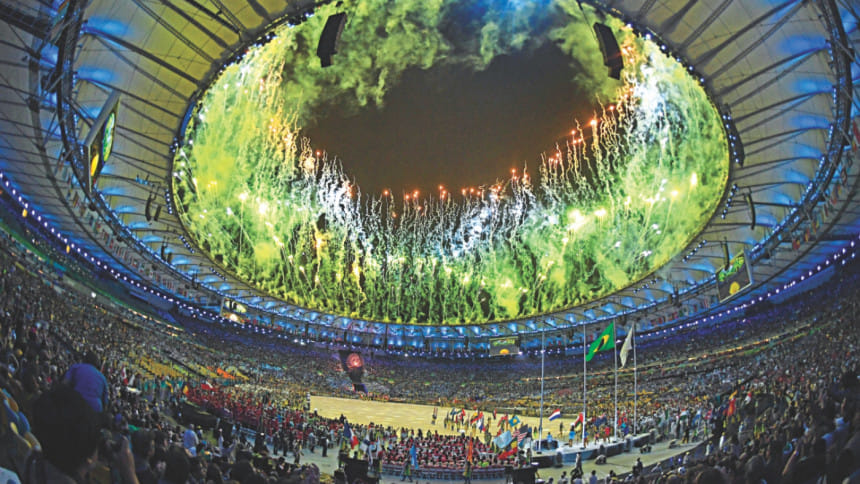Rio bids a colourful goodbye

The 31st Olympic Games had started with a great exhibition of music, dance and colours of life. It ended with another one.
After 17 days of sports extravaganza, and the fanfare that came along with it, South America's first Olympics were wrapped up in a rapturous closing ceremony at the Maracana Stadium on Sunday, passing the baton over to Tokyo.
The build-up to the Games was dogged by a gloomy atmosphere surrounding the South American nation's economy and politics, and amid apprehensions regarding the country's ability to stage the Games successfully. Now it seems that those fears were unfounded. The goal has been met quite successfully; and that too with a limited budget, yet with a big heart.
The day of the closing ceremony had started with ominous clouds hovering in the sky -- keeping with the erratic weather of Rio de Janeiro -- bringing along cold and gusty winds. Doubts had crept in whether the ceremony would be as colourful as it was planned. But those doubts were swept aside as soon as the first fireworks were released, followed by a trip down Brazil's history lane. It kept raining buckets for the rest of the evening, but that hardly put a damper on the festivities.
The rain might have forced quite a few glaring empty seats at the 80,000-capacity stadium, but those who were there were treated to a great feast of rich Brazilian culture and heritage, flora and fauna, music and dance, prompting the athletes in ponchos to swing to the tunes through the three-hour-long ceremony.
The show started with a look back at Brazil's most famous sons and daughters and ended with carnival-like music and samba, with the victory ceremony for the men's marathon and the surprise appearance of Japan Prime Minister Shinjo Abe thrown in for good measure. A special segment, directed exclusively by Japanese artists, showed signs of what to expect from Japan come Tokyo 2020.
Away from the ceremonies the Games ended, as expected, amid the domination of the United States, who grabbed four gold medals on the final day to take their tally to 46 gold medals and 117 medals overall. The surprise factor was Great Britain, who reaped the rewards of massive investment for London 2012 by dispossessing China of the second position. Russian Federation, despite having a large number of athletes ineligible to compete due to drug offences, held on to fourth position while Germany finished fifth.
Japan, hosts of the next Olympics, moved up from 11th to 6th position while Brazil made their best ever finish on 13th position.
The Rio Olympics eventually proved to be just what everyone had feared it might not be. If glitz, glamour and lavishness was the parameter of success of the world's biggest sports extravaganza, Rio de Janeiro would probably rank somewhere in the middle tier, but if passion and commitment was the gold standard, then Rio has certainly earned a special place in the Games' history.

 For all latest news, follow The Daily Star's Google News channel.
For all latest news, follow The Daily Star's Google News channel. 



Comments